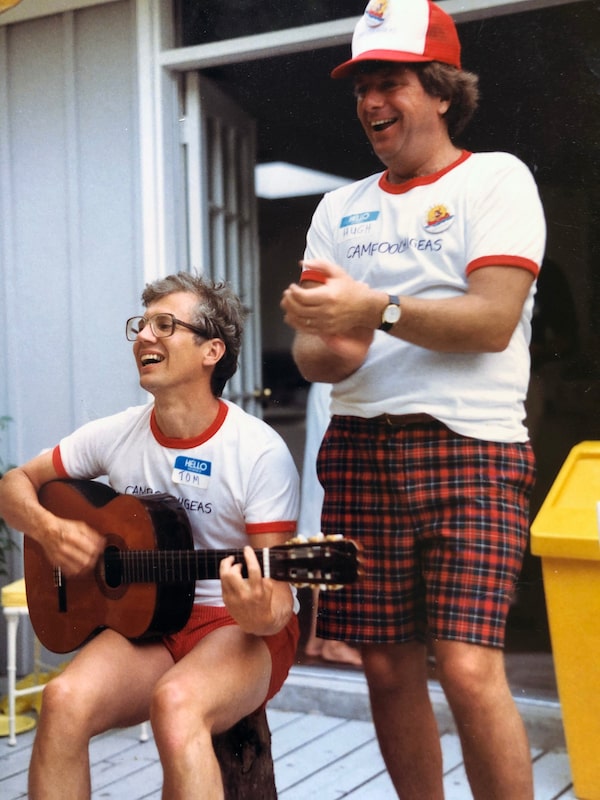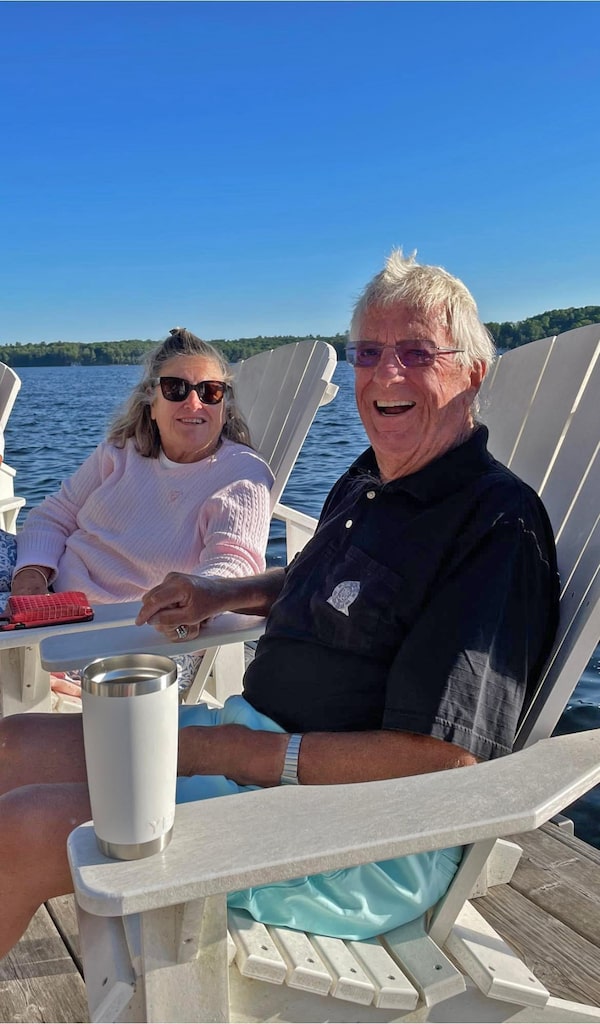
Hugh Rennie, the first director of Camp Oochigeas, a summer camp for children with cancer.Courtesy of the Family
At a family gathering during the winter holidays, Hugh Rennie stood to give a toast. He was always giving toasts, but this time it was as if he was trying to impart something dear to him to his grandchildren.
“I have always felt that if you had something to give it was your obligation to give it,” Mr. Rennie said.
That sense of duty to help make life better for others led Mr. Rennie to become the first camp director of what was then Camp Oochigeas, a summer camp in Ontario free for children with cancer. The camp was the first of its kind in Canada when it opened in 1983.
From that first summer on, Mr. Rennie dedicated his life to the camp: fundraising tirelessly, hiring counsellors, leading children in sing-a-longs by the fire and even coming up with a camp motto.
After devoting so much of his time to working with children with cancer, Mr. Rennie died at home on Jan. 2 after his own brief battle with the disease. He was 80.
The camp was created by a group of board members at Ronald McDonald House Toronto, a charity that gives the families of seriously ill children a place to stay near where their child is being treated.
Camp Oochigeas served only 38 children during its first summer. The nurses on site who administered chemotherapy were the only paid staff; Mr. Rennie insisted that everyone else be there as volunteers.

Camp Oochigeas was the first of its kind in Canada when it opened in 1983.Courtesy of the Family
Today the camp, recently renamed Campfire Circle, annually serves more than 2,000 children and families who are dealing with childhood cancer, and has more than 1,000 volunteers.
“He was the consummate camp director,” Campfire Circle chief executive Alex Robertson says. ”He understood that kids need friendship and need love in order to survive.”
Hugh Charlton Rennie was born in Toronto on May 11, 1940. His father, Walter, was a high-school English teacher. His mother, Margaret, died of cancer when Hugh was 7.
When they were children, Hugh and his older sister, Penny, spent their summers at a resort in Port Sydney, Ont., where their father ran the music program.
Although the musical gene skipped Hugh, he discovered a love of basketball as a teenager attending Upper Canada College. But working with children would prove to be his lifelong passion.
After attending teacher’s college in Toronto, where he met his wife, Janice, he travelled with her to London, England, to teach at a boys’ school.

Mr. Rennie served as camp director and chair of the board for the camp’s first five years then continued on as chair for another five years.Courtesy of the Family
Upon their return, Hugh taught history at Beverley Heights Middle School, in Toronto’s North York district.
He left that job in the late 1960s and found a new career at Imperial Optical, where he began giving management and motivational seminars to the company’s sales force.
Throughout that time he was also spending summers volunteering at a camp for physically disabled children just outside of Toronto.
“He always loved camp. Camping had always been in his blood,” his daughter, Katie, says.
His love of camp, his experience working with disabled children and his irrepressible optimism made him the ideal candidate to be the founding camp director of Camp Oochigeas.
“It was just a passion of his to help kids and he loved the camping world,” says Judy Tripp, one of the founders of Camp Oochigeas.
Initially the camp was under the umbrella of Ronald McDonald House Toronto, but Mr. Rennie was driven to make the camp its own entity.
“It was Hugh and his determination to become our own charity. He was the main force really that raised enough money to actually apply for our own charitable registration number,” Ms. Tripp says.
Mr. Rennie, who served as camp director and chair of the board for the camp’s first five years then continued on as chair for another five years, ran the camp’s fundraising efforts out of his basement.
“He was just so enthusiastic,” Ms. Tripp says. “He would bring new volunteers, new fundraisers, new special events. He was a godsend to the camp.”
In his free time, Mr. Rennie loved to garden at his cottage on Lake Rosseau.
“All summer long if he wasn’t playing golf or tennis he was in his garden,” Katie says.
A dedicated family man, Mr. Rennie was always encouraging his two daughters, Katie and Julie, in their careers in real estate.
“He loved to be our cheerleader,” Katie says.

Mr. Rennie with his wife Janice at the cottage.Courtesy of the Family
And he loved to have a good time, especially whenever he could be with his daughters, their partners and his grandchildren, Madeline, Charlie and Allie Stanton, and Megan and Cameron Osler.
“He really wanted to have people around. He liked nothing better than to make sure that everybody was having a really, really great time,” Katie says.
Holding a concoction he created called What’s On Hughie’s Mind?, initially a mix of Limeade, vodka and soda water that would go through different iterations over the years, Mr. Rennie was never shy about expressing affection.
“He loved to tell people how much he loved them,” Katie says. “Dad just loved to see people smile.”
Maximum fun was the name of the game at Camp Oochigeas for Mr. Rennie.
“He wanted to infuse as much joy in kids lives as he could,” says Katie, who, along with her sister, spent many summers working as a camp counsellor.
When he was the camp director, he would burst into cabins in the morning carrying a giant boom box on his shoulder, playing a tape of Robin Williams screaming “Good morning, Vietnam!” at top volume.
To boost campers’ self-esteem, he created a cheer to be sung around the campfire that celebrated just about everyone at the camp at one time or another, whether it was a kid who dove into the deep end for the first time, the senior girls’ group that returned from a long canoe trip or the cook who happened to make a particularly awesome batch of pancakes that morning.
“What do we think of the senior girls? The senior girls are alright!” Mr. Rennie would call out. Then, the campers would clap their hands and sing back, “We are proud of you, said we are proud of you!”
Campers still sing that song to this day.
But if Mr. Rennie has one lasting legacy above all at the camp, it is the motto by which he lived. The camp officially adopted it as its own: “If you fail you’ve only failed to try. Act as if it’s impossible to fail and it will be.”
Counsellors teach it to new campers. Returning campers will teach it to incoming counsellors. It pervades the spirit of the place, Mr. Robertson says.
“That motto … everybody at camp knows that.”